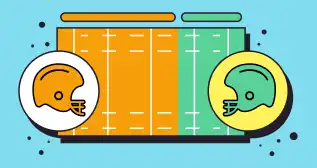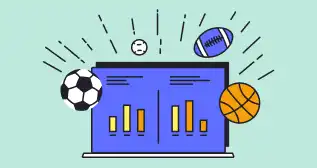When watching sports, the feeling is brilliant, but it becomes more intoxicating like a bottle of champagne when you bet on that sports event, and the winnings are more exhilarating than coition. Therefore, a successful bet makes you feel invincible. But how would you deal with the emotions that outburst when choosing a sport during betting?
Managing the emotions that enact as a roller coaster ride and ironing them out are more complex tasks, as your heart starts ruling over your mind. Here lie some fascinating tips that can tactfully incline your intelligence over fandom during sports betting activities and exaggerating sportsmanship.
Stride Over Monte Carlo Fallacy
A gambler commits the Monte Carlo fallacy by believing that the outcome of a previous event or series of events would manipulate the outcome of a particular random sports event. The thinking is incorrect because, in most cases, gamblers are encouraged by their emotions. The gambler's fallacy involves misjudging a game, as each game is independent, without having any connection with the previous one, so the outcome is naturally based on the current performance. Therefore, it states an inaccurate understanding of probability, which this brilliant example can correct:
When the odds of a basketball team have already landed with three goals in their previous match, the outcome of the current table would not be influenced by two factors:
- The player always needs to get an opportunity to track the right strategy.
- The ball will not be influenced by its previous roll.
However, you can also internalize this concept for other sports betting purposes.
Do Not Allow Your Emotions to Rule Your Decision-Making Ability
It cannot be overlooked that emotions generate decisions with the contents of thoughts. But, mark that it should not overrule it. At sports betting, mainly on live events, you must make instant decisions on the stances, like how much you will bet, the betting market, and the team you are betting on.
Let's illustrate it with an example - assume you are betting on a football event, Barcelona vs. Real Madrid. As you like Barcelona, you would bet on the team despite manifesting the probability of a match that the opponent team has a maximum chance of winning. Will you still bet on the same team or decide with intelligence instead in the context of fandom? The apparent difference between liking and intelligent betting is that the former involves learning concepts, while being wise is a product of experience.
Impact of Cognitive Biases on Sports Betting
Most people who come to drop their near ones at the airports say safe flight, but it never happens when the opposite person says the safe drive to the other one because unwanted incidents may also occur with him. It's a classic example of the availability heuristic, which also happens during sports betting. When assessing two factors: outcomes and risk, bettors often support the easiest-to-remember events, which commonly dictates their understanding of probability.
For example, bettors are evenly hit with questions like: do I think that the match would surely hit the over or under or a total bet which I preferred betting on? The chances are high that the bettor has bet on over or under-market in his last five series, or he likes total bet as it has given good results. Therefore, instead of falling into such trap holes, beat such heuristic biases by researching the statistics of the previous match, team, and their playing technique to cope with intelligence rather than sentiments.
Take Advantage of Emotional Sports Betting
The truly intelligent are the ones who can firmly utilize the wise thing in their work. Isn't it the correct quote? Precisely yes, you can prove yourself more competent by using your emotions wittily in sports betting. Bet on the opponent's favorite sports team to implement an emotional hedge in sports betting. It would not overshadow your love for your preferred team because a financial reward would mitigate the disappointment even if you lose. This behavior is perfectly rational, as it does not qualify for the variance of the expected outcome.
Work More as Odds Compiler to Beat the Bookmaker
Odds compiling relies on databases, whether a casino game or sports betting, and less on intuition and feel. Punters who use reasoning as an instrument to find out the smallest of nuances about how a rugby player would make a 'try' in the current match and bet according to the odds changing as the event is moving towards its end, driven by fundamental inputs and converting those inputs into probabilities during the event are examples of intelligence where emotions don't have any chance to pass by.
Conclusion
A fandom-affiliated bettor showcases his sportsmanship with feelings composed of empathy and camaraderie, showing common interest-craziness in sports betting. Does he act with objective or just passing emotions while betting? The answer to this question is entirely given in the above segments, which states to infuse strategies to deal with the outbursting emotions a person entails with sports. Never show them, or else it will be ruined by others who prioritize intelligence under emotions in sports betting.





